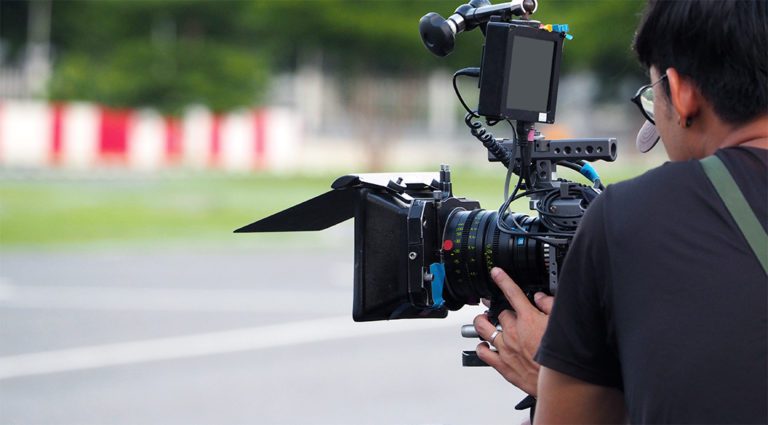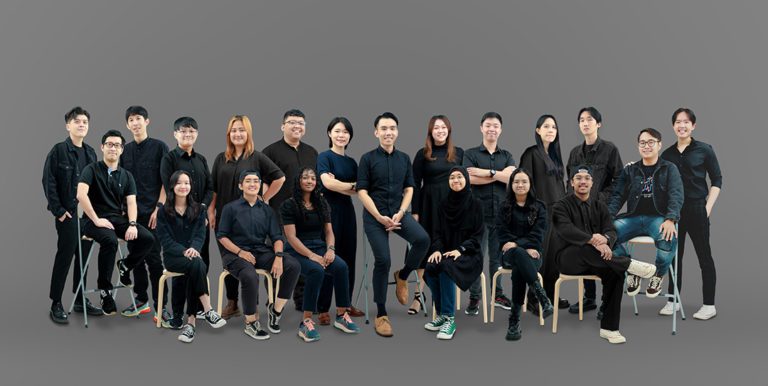Our video editors play a vital role in every successful video project, working tirelessly to ensure that your final video is of the highest quality and perfectly captures your objectives and vision. In this article, we want to recognise our video editors’ work and give clients a glimpse into the world of video editing. Join us as we shine a spotlight on our talented editors and the important role they play in shaping the content of every video we create.
Note: Some content in this article may be enhanced or paraphrased by using AI writer software.
The Vivid Media Production Team
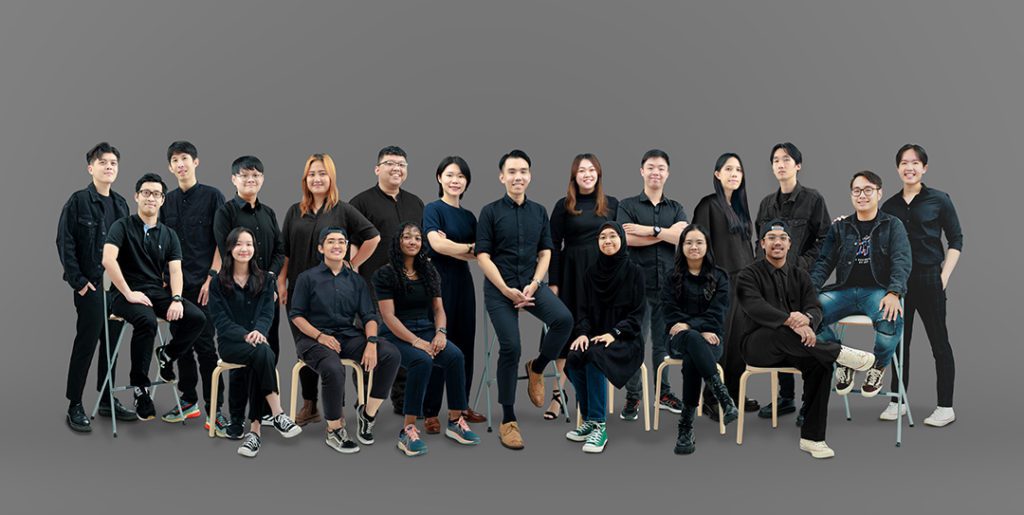
Our team of media professionals is comprised of videographers, directors, project coordinators, graphic designers, and most importantly, our skilled video editors. Our video editors are involved in every video project that we produced.
Our portfolio is focused on corporate clients, and we have produced a wide range of content, including internal communication videos, brand story videos, virtual and hybrid events, and corporate photography. However, it is our talented video editors who bring these projects to life, using their expertise to create creative and impactful content that delivers on our client’s objectives.
Our Video Editors
This section introduces our video editors that you will be working with when you engage our services for your video production. Our video editors are media professionals who take pride in their craft and are committed to delivering high quality videos.
They collaborate with our clients, producer, director and videographers to understand your vision and goals, and then leverage their expertise to bring that vision to life. From selecting footage to editing it meticulously, our video editors ensure that the final product reflects your vision.
Let’s read our interview with our Video Editors!
Gwendolyn Koh, Video Editor
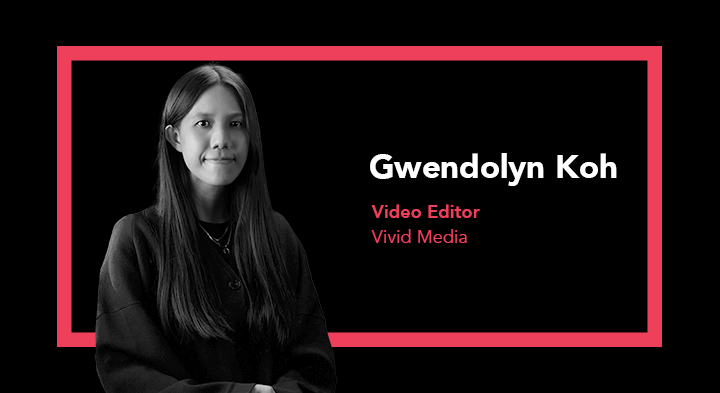
How did you get started in video editing, and what motivated you to pursue it as a career?
My interest in filming videos grew from my passion to capture and preserve memories to look back in the future, this then inspired me to delve into the realm of video editing. The collaborative nature of video production and the constantly evolving nature of the field also kept me motivated to continuously learn and improve my skills. The opportunity to use my creative skills to tell stories, evoke emotions, and communicate messages through visual media is what motivated me to pursue video editing as a career.
Can you describe your creative process when approaching a new project?
To begin the creative process for video editing, I first understand the project requirements and target audience. Researching the topic and analysing the target audience gives me valuable insights that informs my decisions about the appropriate style and tone for the video.
Considering the type of video, such as promotional, educational, or entertainment, is also important in determining the style and tone. Once the style and tone are established, the pacing of the video is determined based on the message that needs to be conveyed. By following this process, I strive to create videos that effectively aligns with the client’s vision through the appropriate style, tone, and pacing.
How do you collaborate with other members of a video production team to bring a project to life?
Throughout the editing process, I share drafts of the video with the director and producer for feedback and revisions. Consulting with other team members also helps to ensure that the final product meets the desired standards. By collaborating effectively during the post-production stage, I can ensure that the final video meets the project’s vision and goals while maintaining a high level of standard.
How do you stay up to date with the latest trends and techniques in video editing?
One of the ways I stay up-to-date with the latest trends and techniques is by watching online tutorials, which helps sharpen my skills. Following experts in the video editing industry on social media is also crucial for staying current with the latest trends and techniques. Lastly, experimenting with new software and tools helps me keep up with the latest technologies and techniques.
What advice would you give to someone who is just starting out in video editing?
Practice and experiment as much as possible to gain experience and develop your skills. Secondly, familiarise yourself with video editing software and learn the basic functions and features, gradually building up your knowledge as you gain experience. Thirdly, staying up-to-date with the latest trends and techniques through industry blogs, tutorials, and workshops is crucial in this constantly evolving field. Fourthly, storytelling skills are important to understand and communicate a compelling story through visual elements.
Communication and collaboration skills, as well as attention to detail, are also crucial in working as part of a team to achieve the desired outcome. Lastly, it’s important to be open to feedback and willing to work with others to achieve the desired outcome!
Jared Yoong, Video Editor
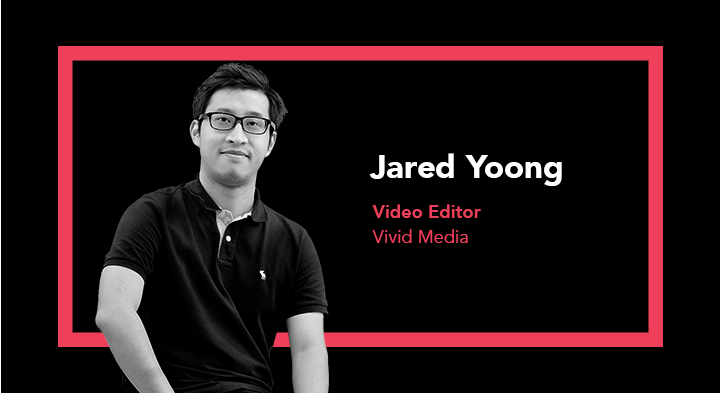
How did you get started in video editing, and what motivated you to pursue it as a career?
My interest in video editing began in 2014. The process of taking individual clips and piecing them together to form the overall story sparked my enthusiasm for video editing. I decided to study filmmaking quite early, and it has been effective in helping me further my knowledge of the craft.
It was during my study that I resolved to pursue a career in video editing. As I wanted to craft stories and I loved the experimental aspect of editing, trying different approaches to find the most effective means of communication.
What kind of software and equipment do you use to edit your videos, and what do you consider to be the most important features of a good editing tool?
I use Adobe Premiere Pro for video editing. I also work with Adobe After Effects for creating motion graphics and DaVinci Resolve for the colour correction and grading of my clips. Two important features of a good editing tool I consider are, firstly, a history feature which shows some or all of your prior actions. The second is specifying the duration of a clip before adding them to the timeline. I feel this helps smoothen the editing process, especially when it comes to overriding existing clips on the timeline.
What are some of the biggest challenges you face as a video editor, and how do you overcome them?
Some challenges I can face when editing a video (especially for events filming) include having footage with less than ideal elements (shaky, obstructing objects, etc.), footage with different white balance. To overcome these problems, I would use effects to try and hide the undesired parts as best as possible, colour correct and grade to make the final work cohesive.
What advice would you give to someone who is just starting out in video editing, and what skills do you think are essential for success in this field?
My advice would be to, when creating the first draft of the video, always have a set vision for how the video is going to be like. This is so you do not get stuck and waste time when editing the first cut. For skills, the most important thing to have is a keen eye for details to spot any small mistakes and to ensure that any cut between shots is smooth and not jarring.
Kevin Chan, Video Editor
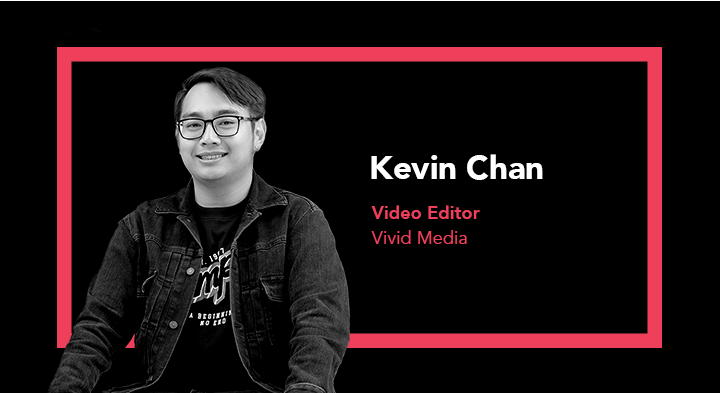
How did you get started in video editing, and what motivated you to pursue it as a career?
I fell in love with video making at a young age when I witnessed the early stages of YouTube and thought to myself, “I wanna make these kinds of videos too!” At that point in time, I didn’t really envision myself as an editor. It was only after I went to film school that I realised that I like this path: to piece together stories.
Can you describe your creative process when approaching a new project? How do you decide on the style, tone, and pacing of a video?
I will usually take a look at the brief and see how much creativity I can stretch. The style, tone and pacing will depend on the brief given, and from there, I will see how far I can elevate the outcome.
What kind of software and equipment do you use to edit your videos, and what do you consider to be the most important features of a good editing tool?
I use the whole Adobe Creative Cloud, which includes Premiere Pro, After Effects, Photoshop and many more. A good software should be easy to use and capable of achieving the minimum requirements of one’s creativity.
How do you collaborate with other members of a video production team (e.g., directors, producers, cinematographers) to bring a project to life?
I will tell the other team members my point of view of the video in terms of the editing timeline, i.e. what scene comes first, how do we transit to the next scene etc. Sometimes I will have a specific request for a particular kind of shot I want if I feel that it can build towards the end output.
What are some of the biggest challenges you face as a video editor, and how do you overcome them?
As an editor, I pride myself as a ‘fix-in-post’ specialist, which means even if all goes well on the actual shoot, there will still be minor hiccups. It is then up to me to make sure that the videos looks as though these hiccups never happened.
What advice would you give to someone who is just starting out in video editing, and what skills do you think are essential for success in this field?
Patience and the willingness to take in feedback. You don’t make a video for yourself to watch. You make a video for others to watch. To call yourself a good editor is pointless if others disagree with you. You can only be a good editor if others say you are.
Nur Sarah, Video Editor
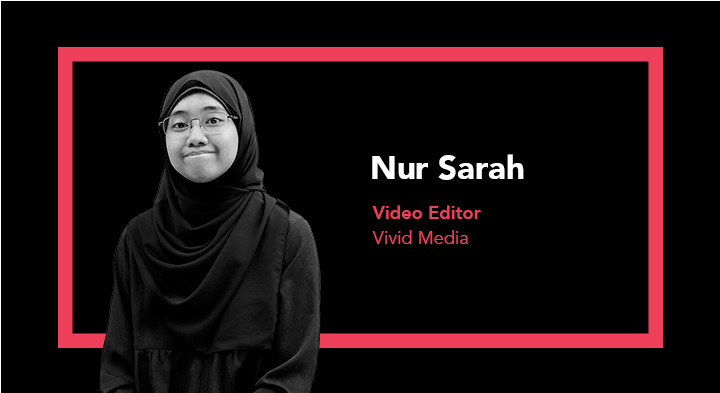
How did you get started in video editing, and what motivated you to pursue it as a career?
To be honest, I spent most of my life not even knowing video editing was a thing. It wasn’t until I took my first video production module in school that I discovered video editing. I actually started out in creative writing, which meant that the basis of what we learned revolved around storytelling. I was quick to realize that my strength was in the visual aspects of it, which soon grew into a love for video editing.
Can you describe your creative process when approaching a new project? How do you decide on the style, tone, and pacing of a video?
I like to watch other videos for inspiration. To me, being creative in my process means mixing and matching what I like from other sources to create something new and unique. Ideas don’t just pop out of thin air, you know 😉
How do you collaborate with other members of a video production team (e.g., directors, producers, cinematographers) to bring a project to life?
When I have a specific idea in mind for a video, I think it’s important to let the videographers know so that their shots line up with what I have in mind for the edit. And when working with directors, it’s about striking a balance between your own style and their vision for the project.
How do you stay up to date with the latest trends and techniques in video editing, and what resources do you find most helpful for professional development?
I like to follow content creators (directors, videographers, editors, even photographers) on YouTube and Instagram. They usually follow the latest trends and have their own unique styles, so I’ll just apply what I like about them to my own edits.
Work With Our Video Editors

We hope this article has provided you with insights of our video editors, who are often working tirelessly behind the screens to craft the perfect video for you.
If you are not currently working with us and are looking for a reliable video production partner, we invite you to get in touch with our team by sending us a message.
Our team of video professionals is ready to support you. Leverage our combined expertise to produce media content that delivers on your objectives. Our core expertise lies in the following scopes:
- Creative video production
- Corporate video production
- Live streaming for virtual & hybrid events
- Corporate photography
- Event photography & videography
For a profile of our team, visit About us to learn more.




